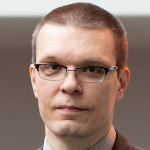
 Samuel Kaski
Samuel Kaski
Professor of Artificial Intelligence
What are your research interests?
Probabilistic machine learning, both fundamentals and applications in health, biology, user interaction. I develop principles and methods for deep probabilistic modelling, multi-agent user modelling, privacy-preserving and federated learning, and simulator-based inference.
What is the focus of your current research?
How to steer AI when we do not know the goal ourselves yet. Developing principles and methods for that; they are needed for developing useful collaborative AI assistants for decision making and design, especially for human-AI research teams.
What are some projects or breakthroughs you wish to highlight?
Earlier ones – I liked multi-task multi-view learning for precision treatment effectiveness prediction, on which we won a DREAM challenge, and interactive intent modelling. But current projects are always the most interesting – stay tuned for synthetic privacy-preserving data, user models with theory of mind, and virtual laboratories.
What memberships and awards do you hold/have you held in the past?
That is much more boring. Biggest news were UKRI’s Turing AI World-Leading Researcher Fellowship, and earlier Academy of Finland’s (roughly Finland’s UKRI) Academy Professorship. I am also ELLIS Fellow and Turing Fellow of the Alan Turing Institute.
What is the biggest challenge in Data Science and AI right now?
How do we make the most general-purpose decision-making method, scientific research, more efficient and effective?
What real world challenges do you see Data Science and AI meeting in the next 25 years?
Climate change, sustainability, affordable high-quality healthcare for all, and a few other minor challenges. I sincerely hope we will be able to do something about those, and I doubt there are better silver bullets than making research more efficient in general. That is why I am working on AI for improving research processes.
